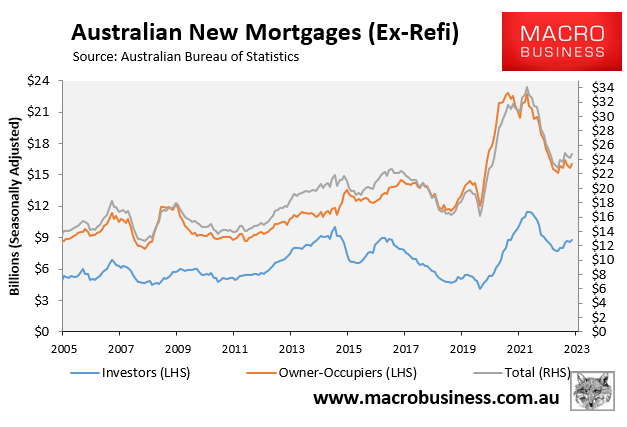Property investors are quitting Sydney and Melbourne in droves, according to new CoreLogic data published in The AFR.
Over the three months to the September quarter, the proportion of investor-owned listings in Melbourne city increased to 60%, up from 56.7% in the previous quarter and a significant increase from 50.9% a year ago.
CoreLogic research director Tim Lawless believes the weak capital gains and new tax laws in Victoria spurred the sell-off, which could continue in the coming months.
“I think this reflects the relatively weak growth outcomes we’ve seen across Melbourne, and it looks like that’s set to remain at least for the rest of the year with stock levels pushing higher and getting to above average levels”, Lawless said.
“There could also be a little bit of a backlash from the state taxation policies that could be disincentivising investors”.
Geoff White, branch manager of Barry Plant Yarra’s Edge in Melbourne, predicted that the number of investor-owned listings would rise in the coming months.
“A lot of landlords are finding it tough to hold on to their investment properties at the moment because of high mortgage repayments and the additional compliance costs due to the recent state policies”, he said.
“At the same time, there’s hardly any capital growth, in some cases, values have gone backwards, so there’s very little incentive for landlords to hold on to their assets”.
The Victorian state government has also announced that it will impose a 7.5% levy on Airbnb properties.
Sydney landlords are also reportedly looking to sell up.
“We’re definitely still seeing a large increase in the number of investors looking to sell compared to a year ago, which has doubled in our books”, said Sydney-based real estate agent and BresicWhitney chief executive Thomas McGlynn.
“I think there are a lot of investors who haven’t come to market yet, but many are thinking about selling and calling us about it. Generally, when you see a large number of inquiries, you’re going to see more investment properties come to market, which we’re expecting later this year or early 2024”.
Commenting on the report, Martin North from Digital Finance Analytics said “the math is pretty obvious” as to why investors are selling.
“Despite the rental increase, there’s a limit on how much investors can lift them as renters are under pressure already”.
“Property investors are also faced with significantly higher interest charges and other costs to the point that the proportion of investors making cash flow positive returns has dropped to an all-time low”.
It is not all dire news, however, with ABS data on new mortgage commitments posting a solid investor rebound, with the value of investor commitments almost back at the 2015 peak:

So, while a higher than usual share of investors are selling up, they are being replaced somewhat by new investor purchases, meaning there is a lot of churn in the market.
The outlook for property investors should also improve over the coming year as the rental market tightens further amid record population growth and below average construction activity.
Furthermore, the RBA is expected to lower interest rates next year, which will make property investing more profitable by lowering borrowing costs and increasing prices.

